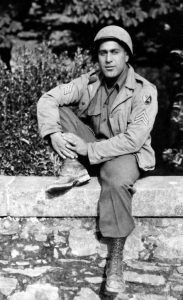
He saved my father. Then, he saved me. In fact, he saved both of us multiple times. The first instance occurred 80 years ago this December. Just before Christmas of 1942, both Tony Mellaci and my father, Alex Barris, arrived at Camp Phillips – a U.S. Army training facility in Kansas. The army had posted them there to train as medics in the U.S. Army Medical Corps. Then, something happened Christmas Eve.
“They told me to go to the headquarters barracks and pick up a soldier who was sick, and deliver him to the hospital. So, I and another ambulance driver picked up your father (although I didn’t know him at the time) and we took him to the hospital,” Mellaci told me. “But we never saw the sick soldier. We stayed in the cab while other medics loaded him into the ambulance.”
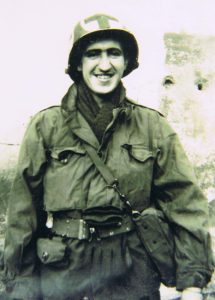
What then Cpl. Mellaci did not know was that my father, Cpl. Barris had a severe cold and fever, according to army records, a temperature of 102 degrees, with a bacterial infection in his chest, throat and sinuses. Doctors concluded my father had contagious pneumonia.
“We were about to leave and a Major told us we couldn’t,” Mellaci continued, “because we were quarantined. But we said we never even saw the guy, never touched him.” So, Mellaci was allowed to return to his barracks and enjoy his Christmas dinner.
It was only after I met and interviewed Tony Mellaci, in 2015, while researching my book, Rush to Danger, when Tony learned it had been my father he’d transported in his Army ambulance to the barracks hospital, that Christmas 80 years ago.
“I never knew until all these years later that it was your dad in the back of my ambulance,” Mellaci said. “He had been really sick.”
Treatment at the barracks hospital brought my father back to health; he returned to his training as a medic, alongside all his fellow corpsmen, including Cpl. Mellaci. Since Tony hailed from New Jersey, and my dad from New York, and because they both were New York Yankees fans, the two recruits hit it off. Their friendship would last through training, transatlantic crossing, service in France and during the Battle of the Bulge in Germany.
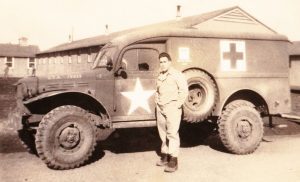
Events of that battle in February 1945, in the coldest winter of the Second World War and the toughest combat the Americans endured at any time during the war (90,000 casualties between January and April 1945), helped seal the comradeship of now sergeant medics Mellaci and Barris.
“Your dad was a runner. He led battlefront medics and stretcher bearers bringing in the wounded,” Mellaci told me, “He handed the wounded off to us in the (ambulance) section.”
In other words, Sgt. Mellaci moved Sgt. Barris’s wounded to safety behind the lines for serious surgery and life-saving. Just like that Christmas back in Kansas, Mellaci came to my dad’s assistance every time he brought in wounded overseas.
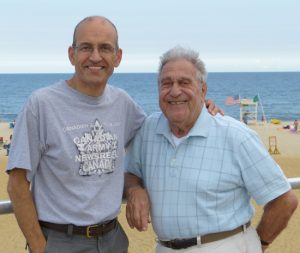
It would take another 70 years before Tony Mellaci saved me. My father had died (at age 82 in 2004) and I came across Mellaci’s name in an archive of their medical unit, the 319th Medical Battalion of the U.S. Army. On a hunch I traced Mellaci to a phone number in New Jersey.
“Mr. Mellaci,” I said, “my name is Ted Barris and I’m wondering if you remember my father from the war. He was a medic…”
“Al Barris?” he interrupted. “The writer? From New York?”
“You knew him?” I asked in tears.
“Knew him? We served together in the 319th. And I’ve always wondered whatever happened to him.”
From that coincidental encounter in 2015, came a trip to visit Mr. Mellaci in Eatontown, N.J., and some of the most enriching days of my life. Tony filled in so many blanks in my knowledge of Dad’s experience in the war, including that he created a newsletter for the medical battalion, and was “a real morale booster” for his fellow medics. In a sense, that’s how Tony saved me, allowing me to record my father’s and other medics’ stories of selfless heroism.
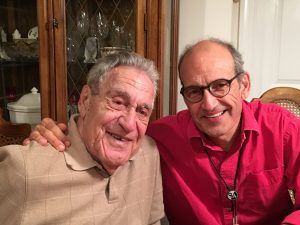
A month ago, I’d planned to join Tony and his wife Sharon and the whole Mellaci family as they celebrated his 100th birthday. But Tony’s unexpected bout of ill-health postponed the party. Then, Tony died this past Father’s Day weekend. He’ll be buried today in New Jersey.
“I never thought much about what we did as medics in the war,” Tony once told me. “But reading your book, I realize what Alex and I did was important. We were saving lives … not taking them.”
I offer this final tribute as thanks to Tony Mellaci for the times he saved my dad and then me.